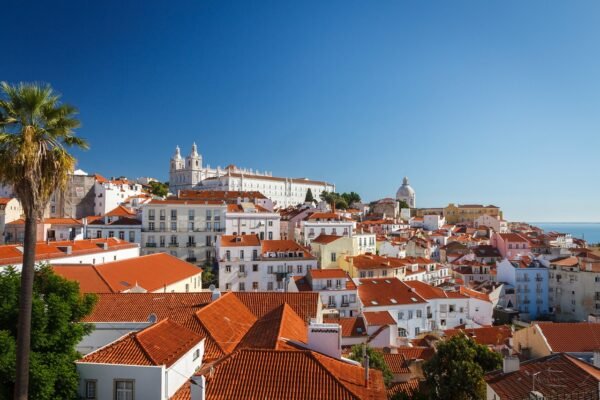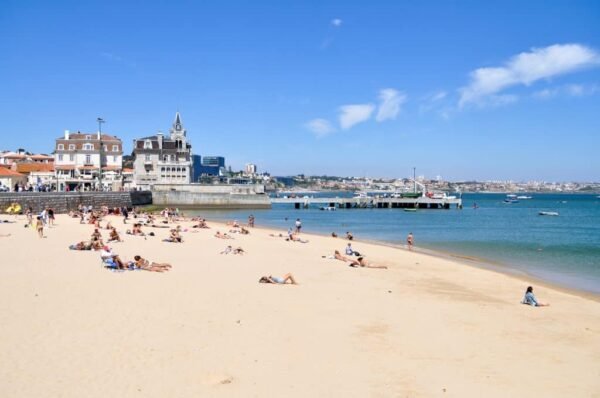
Lisbon has just scooped multiple awards at the World Travel Awards 2022. The city was crowned Europe’s Leading City Break Destination, Europe’s Leading Cruise Port, Europe’s Leading Cruise Destination and Europe’s Leading Seaside Metropolitan Destination as part of a slew of awards that saw Portugal punch well above its weight given its diminutive size compared to many European countries. The city has also just taken third place in Preply’s new index of the best global cities for British expats.
So, what is it about the Portuguese capital that makes it such a haven for Brits living overseas?
1. A smart city

Portugal – and Lisbon in particular – has been on our radar for a while as a destination of choice for digital nomads. The city has the seventh greatest high-speed internet coverage of any EU member state, with 90.5% of homes covered. It is also a hub for tech events, start-ups and innovation, as Christina Hippisley, General Manager of the Portuguese Chamber of Commerce in the UK, points out:
“Lisbon is home to a rapidly growing international community of young entrepreneurs, start-up founders and tech and sustainability innovators. It’s an incredibly energising and exciting environment to be part of, and a substantial draw for those considering making the city their home.”
This dynamic approach has also had an impact at a city-wide level. Lisbon has embraced the smart city approach while putting sustainability at the heart of its long-term goals. This has been so successful that the city reduced CO2 emissions by 50% between 2002 and 2014, and energy consumption by 23% and water consumption by 17% between 2007 and 2013. It serves as a role model for major cities looking to grow sustainably; so much so that it earned the European Green Capital Award for 2020.
Lisbon’s sustainability credentials can be seen in its transport system too. The city is home to one of the world’s largest networks of electric vehicle charging points, along with a bike-sharing scheme that includes electric bikes for navigating Lisbon’s famous hills. 30% of journeys in the city are made by bike or on foot, with bicycle use increasing 138% in the three years to 2020.
Lisbon’s affordable and comprehensive public transport network is another draw for those considering moving to the city. 93% of its population lives within 300 metres of a public transport service that runs frequently, while seniors and students aged 13-23 travel free. Commuters from the suburbs can pay just €30 or €40 for a simple monthly fare pass.

2. Life’s a beach
Lisbon’s beautiful, sandy beaches are within easy reach of the city centre. Costa Caparica is a surfer’s paradise, while the sheltered cove of Praia da Torre is a great spot for sunbathing and swimming, as is Praia de Carcavelos.
The beaches of Cascais, located 30km west of Lisbon, are some of the best near the city and easily reachable by train. Estoril Casino – the birthplace of Ian Fleming’s first James Bond novel, Casino Royale – adds to the area’s attractions.

Lisbon city centre is also home to stunning waterfront areas, lush parks and a huge range of shops, restaurants and leisure facilities, all of which are easily accessible on foot. There are plenty of opportunities to stay close to nature, enjoy outstanding Portuguese cuisine and shop till you drop, all within easy reach of each other.

3. Property potential
“The range of property available in Lisbon city centre and the suburbs means that there are homes available to suit every buyer’s taste,” comments Christina Hippisley of the Portuguese Chamber of Commerce in the UK. “Whether it’s a contemporary urban apartment, a rustic home in the twisting streets of the Alfama neighbourhood or a spacious villa further out, the property market offers homes that are excellent value compared to many other European capitals.”
As an example, a brand-new two-bedroom/two-bathroom apartment neighbouring the swanky Principe Real district is available for €700,500. A three-bedroom villa with its own pool in the greater Lisbon area, meanwhile, provides plenty of space for family life for just €588,862.
For Britons who choose to make Lisbon their home, there is already a large community of expats in the city, which can ease the settling in process for newcomers. According to data from Confidencial Imobiliário, Brits made up up 10% of the home-owning international community in Lisbon in 2021. Many more Brits can be found renting homes in and around the city.
Anyone searching for more information on moving from the UK to Lisbon can find all they information they need at the free-to-attend Moving to Portugal Show in London on 20thOctober 2022.

4. Family life
Lisbon’s coastal location and abundant green spaces make it a lovely city for family life. It is also a “very safe” city, according to Travel Safe Abroad, with a low crime rate. Portugal as a whole ranks in the top five safest cities in Europe, based on World Population Review data.
From a schooling perspective, Lisbon has plenty to offer international families who choose to make the city their home. It is home to the Católica Lisbon School of Business & Economics, which is one of Europe’s top 30 business schools and home to the multi-disciplinary Smart City Innovation Lab. Lisbon’s NOVA University, meanwhile, has just opened its first campus outside Portugal – in Cairo – enhancing the city’s international connections. Lisbon’s international school community includes the popular IPS British International School, Cascais, while the city also added United Lisbon International School to its offering in 2020.
“Lisbon is a lovely location for family life,” concludes Christina Hippisley. “It ticks all the right boxes when it comes to schooling, safety, amenities and opportunities. It’s actually a very versatile location, appealing to individuals and families at many different stages of life and with different priorities. That widespread appeal is part of the city’s charm.”
Written by: Louise Taylor

Louise Taylor is a professional freelance writer whose content covers travel, tourism and languages. She has a particular interest in overseas property and is happiest when writing about Portugal and Spain.
